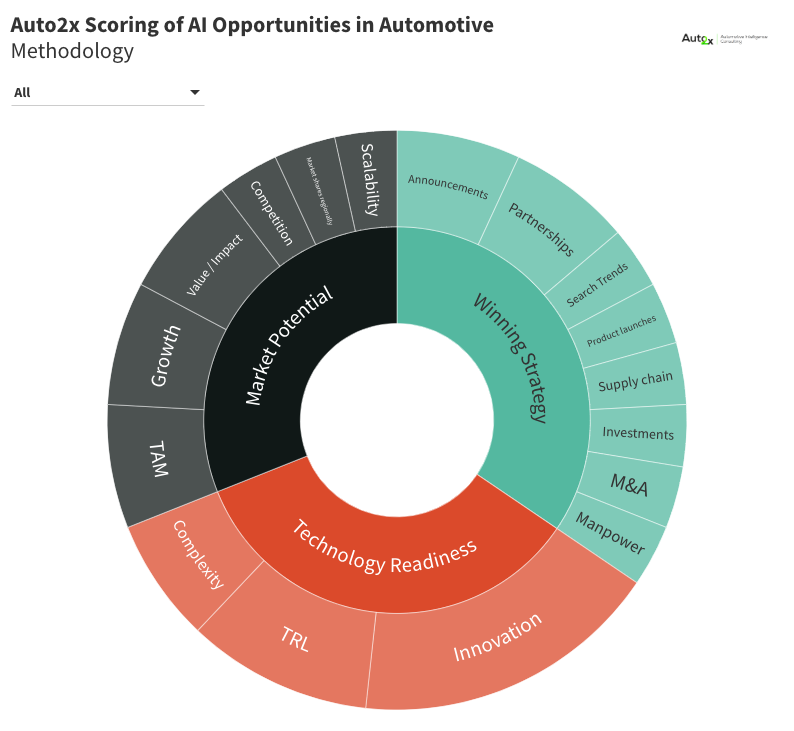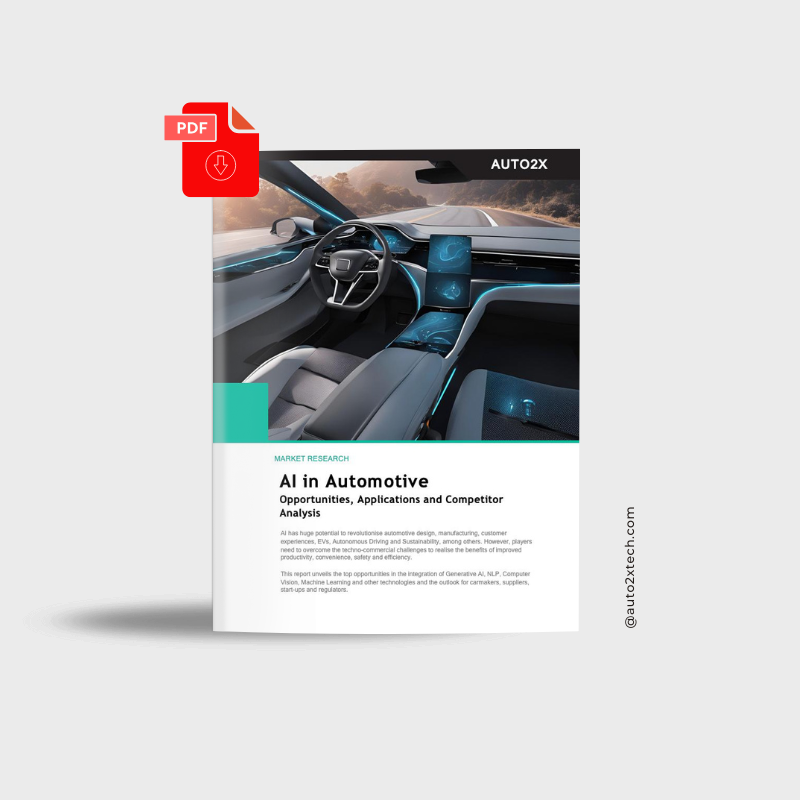Your basket is currently empty!
AI in Automotive: Opportunities, Applications and Competitor Analysis
AI has huge potential to revolutionise the whole Automotive value chain, from generative AI design to manufacturing, vehicle utilization, EVs, Autonomous Driving and end-of-life. Leverage our Live rankings of 50+ identified opportunities, 200+ use cases of AI from carmakers and suppliers, Company Readiness Scores and innovation Roadmaps to prepare for the era of AI-Defined vehicles.
Questions? We’re here to help! Request a free personalized video presentation of this report.
Top-50 Opportunities Fueling Growth in AI in Automotive
The automotive industry has used AI for decades, such as Computer Vision and Machine Learning for vehicle perception in autonomous driving, robotics in manufacturing, and NLP for voice recognition in-car assistants.
However, the era of the “AI-defined Car” is just starting to impact the whole Automotive value chain.
The convergence of innovation breakthroughs in AI, such as huge strides in GAN and advancements in computational power, with commercial readiness and strong investments, unlock opportunities for new revenues, product differentiation, operational efficiency and regulatory compliance.
Auto2x has developed a proprietary methodology of scouting for growth opportunities and prioritising them to help stakeholders turn data into action. Access the Live Ranking with 100+ opportunities of Ai in Automotive.

The Rise of the AI-Defined Vehicle
AI-defined vehicles represent a transformative shift in automotive technology from supervised machine learning to self-learning AI taking central role
An AI-defined vehicle is distinguished by its reliance on artificial intelligence (AI) as a central component in driving operations, vehicle management, and user interactions.
Unlike traditional vehicles or even many autonomous systems that depend heavily on predefined programming and extensive sensor arrays, AI-defined vehicles use AI algorithms to process and adapt to real-world environments dynamically.
Tesla is a pioneer in this space pushing the boundaries and emphasizing adaptability, scalability, and efficiency over traditional sensor-based autonomy systems.
The Explosion of Vehicle Data and the Shift to On-Board Real-time Processing with AI
Modern autonomous vehicles leverage deep learning algorithms that process extensive data from various sensors in real-time. AI enables vehicles to analyze real-time data from their environment, including traffic conditions and obstacles, which is crucial for safe navigation.
With data processing moving from offline to on-board vehicles, demand for AI to improve data processing and real-time decision-making for critical operations in EVs and ADAS is increasing.
Innovation is marching strong Creating Opportunities for Differentiation and Revenues
AI research output has increased from less than 1 million papers in 2021 to 13 million papers in 2021, an increase of 1300%.
The analysis of the Patent Landscape Report on GenAI by the WIPO revealed that Asia companies hold the lion’s share in publications. Tencent, Ping An Insurance Group and Baidu own the most GenAI patents.
Strong innovation is helping Asian players develop a competitive advantage and monetize their edge through licensing Standard Essential Patents (SEPs).
Rising Demand for AI Chips for Inference and Model Training Reveal Early Winners
Demand for more and faster Graphic Processing Units (GPUs) is getting stronger as demonstrated by the financial performance of NVIDIA, AMD and other AI leaders. GPUs are used for answering questions on existing models (inference) and during the development phase of an AI model (training).
New Generative AI Applications in Cars Enhance Customer Experiences
Generative AI can enhance automotive design, manufacturing, customer experiences with better communication between drivers and car assistants, as well as vehicle perception for Autonomous Driving from Baidu & Haomo.ai.
Investment in AI in Automotive is Booming To Control AI Infrastructure
- Investments in AI startups surged to $24 billion from April to June 2024, more than doubling from the previous quarter. AI start-ups raised $27.5 Billion in Q1-Q2 2024 across industries, from Elon Musk’s xAI raising $6 Billion to race OpenAI to super-computers, health and others.
- Microsoft, BlackRock and NVIDIA are investing more than $30 Billion to build data centres and energy projects to fill the growing demand for AI
- Demand for power to train AI models and process data will skyrocket!
- Amazon spent $2.75 billion on AI startup Anthropic in its largest venture investment yet
Partnerships between AI Leaders and Automotive Players are on the Rise To Enhance Market Positioning
BYD’s partnership with NVIDIA focuses on AI training and in-car computing for EVs, highlighting China’s strategic push in AI integration.
Players Must Overcome Roadblocks to Unlock the Full Potential of the AI-Defined Car
To realise the full potential of AI in Automotive, players must solve technological challenges in the integration of tech, balance the high investment cost with prioritisation of applications with high ROI and develop in-house expertise to stay relevant.
Furthermore, they will have to protect their Intellectual Property, guarantee safety, privacy and security for their customers and manage regulatory mandates and ethical development requirements.
10 Reasons You Should Read This Report: Our Unique Value Proposition
This report analyses the strategies, technologies and market potential of AI in Automotive to provide competitor insights and actionable guidance.
- Live Ranking of Top-50 Opportunities in Artificial Intelligence to generate revenues, advance products or improve efficiency
- Innovation Roadmaps in 30+ key AI technologies incl. CV, ML, GenAI, NLP, EmotionAI, OpticalAI;
- Live Database with 200+ AI-Automotive Use Cases across the Automotive Value Chain
- Top20 Players including carmakers and suppliers’ strategy and technology readiness
- Competitor analysis: Identify strengths and portfolio gaps
- Live AI Start-up Database & Scoring: +1000 start-ups ranked
- Top Innovation Hubs
- Interviews with CXOs
- Continuous data updates through our innovative automated intelligence technology.
- Our report is designed for unlimited access, allowing you to share it freely among your team without any user restrictions
Our Unique Methodology
Live Ranking of Top Opportunities in AI in the Automotive Industry
Auto2x synthesizes innovation metrics, data, expert opinion and proprietary methodologies to develop a long list of disruptive opportunities to innovate, generate new revenues, expand to new markets and improve operational efficiency.
We assess each opportunity based on its Market Potential and Technological Readiness Scores, which are weighted scores comprising TAM (Total Addressable Market), TAM Growth, Competition, Value addition, Investment, Technology Readiness Level (TRL), Patent filings and Scientific research, Scalability and others.

Live Database with AI-Automotive Use Cases From Design to End-of-Life
Auto2x has developed a unique database of AI applications across the value chain in Automotive and use cases in Automotive which is accessible as part of this report. The database unveils
- how is AI revolutionising the Automotive value chain from design to manufacturing, use and recycling;
- the strategies of carmakers, automotive suppliers, start-ups and tech giants
- their partners and ecosystem to bring the technology to market
- the domains (e.g. Electric cars, Autonomous Driving) these applications focus on
- the technological enablers, such as NLP, ML or Generative AI, empowering the solutions

9 Questions This Report Answers About AI in Automotive
- Which are the Biggest Opportunities in AI for Automotive to generate revenues, innovate or build competitive advantage?
- How can players overcome the technological and commercial challenges of integrating AI in Automotive?
- Which applications of AI in Automotive have the biggest potential, e.g. TAM or Return-on-Investment)?
- Which innovations in AI are fueling growth in Autonomous Driving and Electric Vehicles?
- What is the future of AI in vehicle interiors?
- How will electric vehicles evolve utilising advancements in artificial intelligence?
- Who are the best partners to build AI-enabled products and improve AI readiness?
- What are the biggest opportunities in AI Automotive Start-ups?
- What is the outlook for AI Intellectual Property in Automotive?
Who Should Read This Report
- Automotive professionals
- Investment teams
- R&D teams
- Innovation
- Consultants
- Regulators
- Industry Associations
Table of Contents
- Executive Summary
- The Opportunity in AI in Automotive
- Ranking of +100 Opportunities in AI for Automotive by Market Potential and Tech Readiness
- Analysis of +100 Opportunities by Market Potential
- Assessment of each Opportunity by Technology Readiness Level
- Recommendations for Incumbents and New Market Entrants
- Deep Dive in AI Technology for the Automotive Industry
- Foundation Models
- AI Hardware
- AI Software
- AI Infrastructure
- Silicon Opportunities
- Compute and Inference
- Generative AI and opportunities in Automotive
- NLP
- Machine Learning, Supervised, Unsupervised
- Computer Vision
- AI Agents
- Federated Learning
- Enterprise AI
- Applications of AI across the Automotive Value Chain
- Generative AI Design: Opportunities, Technologies, Challenges and Players
- Manufacturing Optimisation
- How to Improve Quality
- AI in Autonomous Driving: CV, DL, ML, Generative AI and LLMs
- AI in Electric Vehicles: from batteries to powertrains and charging
- NLP and GenAI in Vehicle Interiors: From In-car Assistants to AI Companions
- Artificial Intelligence in Mobility-as-a-Service (MaaS)
- Predictive Maintainance
- AI in Aftersales and Customer Support
- AI for Sustainable Mobility: Recycling, Repurposing, End of life
- Key Partnerships and the Development of Ecosystems
- The Biggest Investments in AI in the Automotive Industry
- Evolving Regulation and Ethical Standards
- Why Regulate AI
- EU AI Act
- US AI Policy
- China’s Regulation and AI Standards
- Ethical AI and Automotive Approaches
- Interviews with CXOs
- Competition and Player Strategies
- Carmakers: Leaders vs. Laggards
- Suppliers: Readiness Levels
- Tech Giants: New Entrants and Emerging Leaders
- Start-ups: Emerging Stars
- Innovation Hubs
Companies Mentioned: +20 OEMs, +30 Suppliers and +1000 Start-ups
- Carmakers: Aston Martin, Audi, BMW, Honda, Hyundai, KIA, Jaguar Land Rover, Lotus, Mercedes-Benz, Mitsubishi, NIO, Nissan, Porsche, Renault, Smart, Skoda, Tesla, Toyota, Volvo, VW, XPeng, Zeekr
- Suppliers: Amazon, Alibaba, AMD, Apple, arm, Autoneum, Axios, Baidu, Blackberry, Continental, Denso, Foxconn, Google, Harman, Helm.ai, Hitachi, Hyundai Mobis, Huawei, IBM, Intel, Kodiak Robotics, Lear, Lenovo, Mando HL, Microsoft, Mobileye, NVIDIA, Qualcomm, Texas Instruments, TSMC, Valeo, ZF
- Start-ups: +1000, including AiAthena, Recogni,
- MaaS: Waymo, Uber, Lyft, TIER, Pony
- Regulators
- Foundational Models, LLMs: Anthropic, Meta, Google, OpenAI, xAI
- Other: Accenture, Bain, CitiGroup, Goldman Sachs

